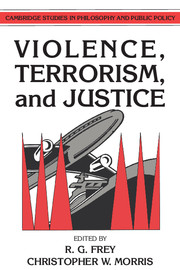Book contents
- Frontmatter
- Contents
- List of contributors
- Preface
- 1 Violence, terrorism, and justice
- 2 What purposes can “international terrorism” serve?
- 3 Violent demonstrations
- 4 Terrorism, rights, and political goals
- 5 The political significance of terrorism
- 6 Terrorism and morality
- 7 Which are the offers you can't refuse?
- 8 Making exceptions without abandoning the principle: or how a Kantian might think about terrorism
- 9 State and private; Red and White
- 10 State terrorism
- 11 Nuclear hostages
- 12 Rape as a terrorist institution
11 - Nuclear hostages
Published online by Cambridge University Press: 05 June 2012
- Frontmatter
- Contents
- List of contributors
- Preface
- 1 Violence, terrorism, and justice
- 2 What purposes can “international terrorism” serve?
- 3 Violent demonstrations
- 4 Terrorism, rights, and political goals
- 5 The political significance of terrorism
- 6 Terrorism and morality
- 7 Which are the offers you can't refuse?
- 8 Making exceptions without abandoning the principle: or how a Kantian might think about terrorism
- 9 State and private; Red and White
- 10 State terrorism
- 11 Nuclear hostages
- 12 Rape as a terrorist institution
Summary
Most of us believe that terrorists act wrongly when they seize civilian hostages to enforce political demands or otherwise advance their political programs. At the same time, many of us believe that nuclear deterrence is morally permissible, or at least would be if that policy were carried out in the right way. There is an apparent inconsistency lurking here. For as has been frequently pointed out since early in the nuclear age, when nation A practices nuclear deterrence against nation B, A – in effect – holds a large fraction of B's civilian population hostage to the good behavior of B's government. As Thomas Schelling aptly puts it, “The ‘balance of terror’ … is simply a massive and modern version of an ancient institution: the exchange of hostages.”
This view of the balance of terror immediately suggests an argument against the moral permissibility of any form of nuclear deterrence that threatens retaliation against civilians. This argument – the nuclear hostages argument – is a deontological argument; that is, it condemns nuclear deterrence not because of its consequences, but on the basis of morally objectionable features inherent in the policy itself (or the acts required to implement it). More specifically, the nuclear hostages argument says nuclear deterrence is wrong because, as a form of political hostage taking, it shares the features that make terrorist hostage taking morally wrong.
My aims in this essay are two. First, I argue that there is no genuine inconsistency in our beliefs about nuclear deterrence and terrorists' holding people hostage.
- Type
- Chapter
- Information
- Violence, Terrorism, and Justice , pp. 276 - 295Publisher: Cambridge University PressPrint publication year: 1991
- 1
- Cited by



